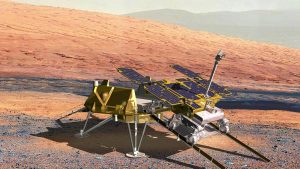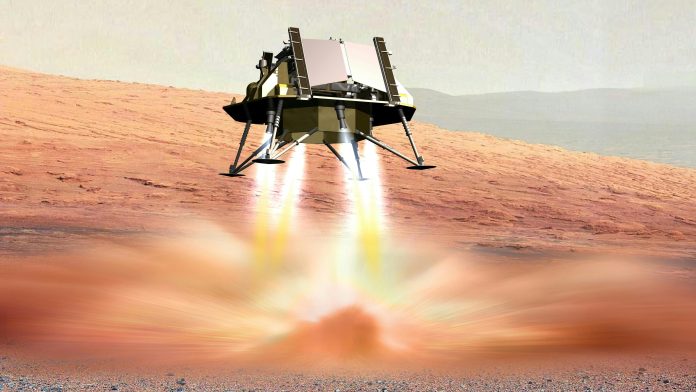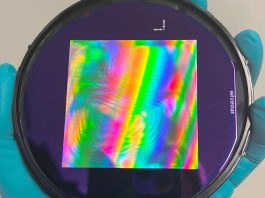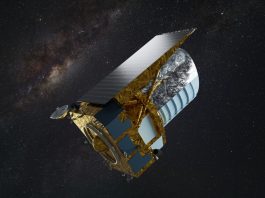The UK is making history in space exploration as Airbus UK secures a £150m contract to land the first European-built rover on Mars.
This groundbreaking mission, funded by the UK Government and the European Space Agency (ESA), will see the Rosalind Franklin Mars rover touch down on the red planet in 2030.
With Airbus engineers leading the charge, the mission aims to unlock secrets of ancient life on Mars while driving innovation and investment in the UK’s growing space sector.
Commenting on the landmark project, Paul Bate, CEO of the UK Space Agency, said: “This is humanity defining science, and the best opportunity to find if past life once existed on Mars.
“We’re proud to have funded this world-leading technology. The ripple effects of space exploration discoveries extend far beyond the realm of space exploration, driving progress and prosperity across multiple sectors in the UK and inspiring technological advances to benefit us all. Our journeys into space continue to improve our lives here on Earth.”
Mission to uncover signs of ancient life
Aptly named after the British Scientist who was pivotal in uncovering the molecular structures of DNA, the Rosalind Franklin rover is a key part of the ExoMars programme that will explore the Martian surface.
The Mars rover aims to drill up to two meters beneath the planet’s surface in search of fossilised microbes, potentially unlocking secrets about the formation of our solar system and the possibility of extraterrestrial life.
The mission will also provide valuable insights into planetary climate shifts, enhancing our understanding of Earth’s environmental changes.
Advanced UK engineering powers Mars exploration
Built entirely in Stevenage by engineers from Airbus UK, the Mars rover is scheduled for launch in 2028, with a planned touchdown on the Martian surface in 2030.
Originally set to launch in 2022, the mission faced delays due to the ESA severing ties with Russia following its invasion of Ukraine.
Since then, the UK Space Agency and its international partners have stepped up, replacing crucial Russian components, including the landing platform and key scientific instruments.
Cutting-edge robotics and autonomous navigation
The success of this ambitious project relies on state-of-the-art UK robotics and autonomous navigation technologies developed for both space and Earth-based applications.
These advanced systems, originally designed for Mars, also have potential uses in hazardous environments on Earth, including nuclear power plants and deep-sea exploration.

Kata Escott, Managing Director of Airbus Defence and Space UK, added: “Getting the Rosalind Franklin rover onto the surface of Mars is a huge international challenge and the culmination of more than 20 years’ work.
“We are proud to have built the rover in our state-of-the-art Stevenage cleanroom and delighted now to develop the project to ensure its safe delivery to Mars.
“Rosalind Franklin will be the first Martian rover able to analyse samples from 2 metres below the surface in its search for past or present life.
“The mission will supercharge our space know-how in the UK and will advance our collective understanding of our solar system.”
Collaboration across science and industry
This groundbreaking mission results from extensive collaboration between the UK, European, and international scientific communities.
Under contract with aerospace giant Thales Alenia Space, Airbus UK engineers will develop the mechanical, thermal, and propulsion systems for the lander, ensuring a stable and safe descent.
The lander will feature ramps on either side, allowing the rover to exit onto the Martian surface via the safest possible route.
Leading UK universities will play a vital role in this historic endeavour. Scientists from University College London, the University of Leicester, and Aberystwyth University are spearheading key technological developments, including the PanCam camera system and an infrared spectrometer designed to analyse Martian rock samples for biological evidence.
Boosting the UK’s space sector and economy
Beyond scientific achievements, this mission is a significant boost for the UK’s space sector, supporting around 200 highly skilled jobs and attracting international investment.
As part of the UK’s broader economic and technological growth strategy, this initiative reinforces the nation’s position as a leader in space exploration.
With its ambitious goals and pioneering technology, the Rosalind Franklin Mars rover marks a major milestone in space exploration, setting the stage for future discoveries on the red planet.









